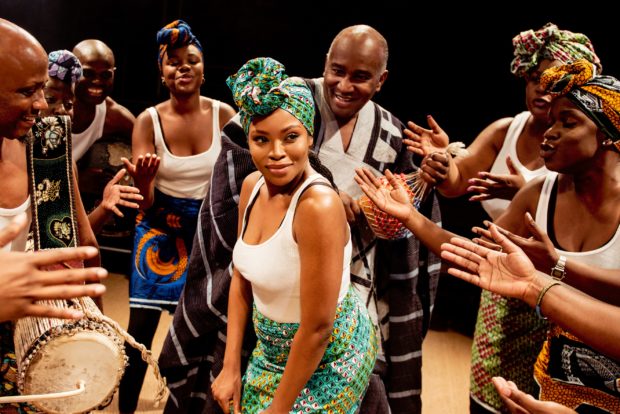You have no items in your cart. Want to get some nice things?
Go shopping
The Secret Lives of Baba Segi’s Wives begins and ends with a young woman alone with her suitcases. “I have rejoined my life’s path,” she declares. Who can say that but someone who’s seen the future? In this case, the young woman, Bolanle (Marcy Dolapo Oni) has seen and left the past. A traditional, prosperous and provincial Nigerian family is set on a path of destruction when the patriarch Baba Segi, personified by Patrice Naiambana, decides to take a fourth wife. It’s a classic story: a family looks good from the outside but there is something rotten at its base; meanwhile, a careful web of power structures – between the husband and the wives and secrets among the wives themselves – holds it together. The catalyst arrives in the form of beautiful Bolanle with her university degree, faith in science, and a different kind of integrity.
Rotimi Babatunde’s adaptation of Lola Shoneyin’s prize-winning novel is alive with desire: visceral, physical, blinding desire. Femi Elufowoju’s assured direction affords enough nimble sidesteps that the action is never heavy. A local fortune teller called “The Teacher”, one of several roles played with aplomb by Ayan de First, tries to be solemn from the balcony while an abandoned woman steals the show from the other side of the room with her own brand of wisdom: “If not that women needed men’s seed for children, it would be better to sit on a finger of green plantain.”
Naiambana’s Baba Segi is a polygamous buffoon who knows that he is of a dying breed: the successful peasant businessman whose natural ecosystem is shrinking every day. “You want to marry that overfed orangutan?” Mama Bolanle (Ayo-Dele Edwards) despairs of her educated daughter’s choice. For some women it is no longer enough for the man to have an income. Bolanle, however, has her reasons. Soon she is in Baba Segi’s house with Iya Segi (Jumoke Fashola), the first wife who dreamt of making love to another woman on her wedding night; Iya Femi (Christina Oshunniyi), the second wife who believes in the devil; and e, the supposedly simple-minded Iya Tope who was given away to settle her father’s debts. It is a pleasure to see how distinctly each character is drawn although all four women are defined by their lack of power. The first three illiterate wives solve their problems in this unfair order through lies and mystifications. The fourth wife’s loss of power is incidental. She decides to address their problems differently. The eldest wife recognizes Bolanle for the threat that she is and decides together with Iya Femi and Iya Tope to eliminate her.
Rotimi Babatunde, recipient of the Caine Prize for African Writing in 2012, is ambitious. His show Feast, a collaborative work between five playwrights from as many countries, was no less than an epic through which Yoruba history was told spanning three hundred years and the entire planet. In The Secret Lives of Baba Segi’s Wives, Babatunde, together with Femi Elufowoju, have put together a grand spectacle that captures the sun of West Africa and the warm energy that permeates everything there. From the drumming to Shola Ajayi’s costumes to the dancing that together, in effect, create the set, we are transported to Ibadan where, like everywhere, men and women think a lot about sex. And it is through sex that the changes brought on by the outside world are felt most deeply. Baba Segi must produce a sample of his sperm for lab analysis in a glass container. The scene around this event for a man who obviously prides himself on not needing to masturbate as he has four wives is nothing short of breathtaking.
When Iya Segi’s master plan goes horribly wrong, we feel her despair. Not because of her tears or her laments but because of her humility: her willingness to go on living, even though the worst thing that could happen to her just has. Baba Segi tells his sons what he’s learned: “Take one wife and one wife alone. And when she causes you pain, as all women do, remember it is better that your pain comes from one source.”
The Secret Lives of Baba Segi’s Wives takes us to the sweet spot when a society is on the brink of profound change, before technology and the culture of efficiency take complete hold and there are still people who believe in the old ways and can interpret the new with the kind of wisdom that comes from living slowly and somewhat hopelessly.
The Secret Lives of Baba Segi’s Wives continues at the Arcola Theatre until July 21st.
About Isabelle Dupuy
Isabelle Dupuy is a writer based in London. She is currently working on a novel "Living the Dream"





Reads like a Must See! I am curious about this many wives setting (and any man who thinks that it can be a good idea!)
Polygamy was once an accepted socio economic model of family structure in villages, matches were ‘arranged’ and a Wife was more ‘responsibility’ and Less ‘property’ as was then often the case and indeed legal term in the Medieval Western societies. Both so called ‘Practices’ are now frowned upon in the west, in fact, both are illegal. It seems we’re still in a state of Practice with the promotion of every other conceivable type of familial combination. FGM & Male Circumcision are On the Way Out, Gender reassignment on the rise..same thing really…what suits people.